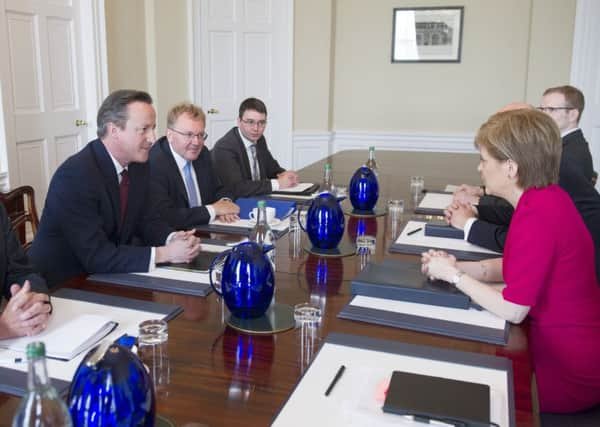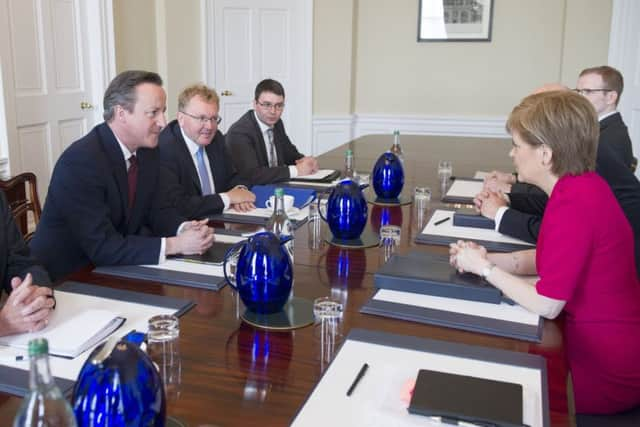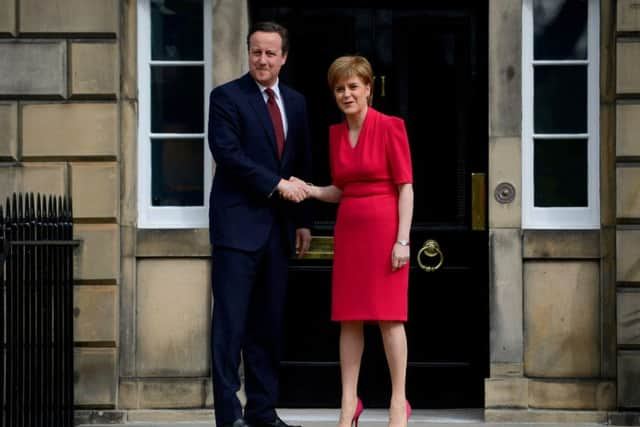David Cameron to consider more powers for Holyrood


Following the meeting, he indicated for the first time that he was prepared to go further than the “more powers” package outlined by Lord Smith of Kelvin in the aftermath of the referendum.
Despite the Prime Minister’s willingness to examine Ms Sturgeon’s demands for a more powerful Holyrood, he was not prepared to go as far as meeting the SNP’s calls for all taxation and spending to be devolved.
Advertisement
Hide AdAdvertisement
Hide AdSpeaking after his first meeting with Ms Sturgeon since the general election, Mr Cameron said his priority was to deliver the Smith package drawn up in response to the “vow” on more powers, made by the pro-Union parties in the run-up to the referendum.


But faced with a resurgent SNP following last week’s landslide, the Prime Minister added that he would look at the proposals for further change suggested by Ms Sturgeon when the Smith plans are debated in the House of Commons.
The Prime Minister’s remarks came just a few days after the new Scottish Secretary, David Mundell, hinted that the UK government would be prepared to hand over a more radical package than that proposed in the Smith Commission.
“The First Minister wants to send some proposals for me to look at and I am very happy to examine those proposals,” Mr Cameron said.
“There is going to be a debate. Of course there is going to be a debate, and I don’t rule out making other changes if sensible suggestions are made. Also, there is going to be a debate in parliament.”


He went on: “The Scottish National Party has now got 56 members of parliament. There is going to be a Scotland Bill. There will be an opportunity for them to put forward amendments. There will be debates over that bill.”
The Smith proposals, which were signed by all Scotland’s main political parties, included giving Holyrood the power to set income tax rates and bands, as well as control over a share of VAT and some welfare benefits.
In addition, Ms Sturgeon wants Holyrood handed control over employment policy, including the minimum wage, welfare, business taxes, national insurance and equality policy.The SNP’s general election manifesto called for Scotland to be given full fiscal autonomy – a constitutional arrangement that would see Holyrood control all taxation and spending.
Advertisement
Hide AdAdvertisement
Hide AdMr Cameron said: “I think it will actually be quite good that those people who want full fiscal autonomy will have to define what they mean.
“They will have to put forward proposals that everyone else will scrutinise.”
With independent reports suggesting full fiscal autonomy would result in Scotland inheriting a multi-billion-pound spending gap, Mr Cameron underlined that he was against moving to such an arrangement.
“The future that I would offer, and I think many others would offer, is a much stronger Scottish Parliament with tax and spending powers and with the extra powers that Smith talks about with the solidarity of the United Kingdom,” he said. “I think the option of full fiscal autonomy is not a good option for Scotland inside the United Kingdom. I think it would land Scottish taxpayers with £7 billion of extra taxes or the Scottish people with £7bn of extra cuts.
“I believe in the solidarity at the heart of the United Kingdom, so it is an honest disagreement between the First Minister and me about this. But we will deliver a stronger Scottish Parliament. Be in no doubt.”
Ms Sturgeon described the hour-long talks as “constructive and business-like”. The First Minister welcomed the Prime Minister’s willingness to look at the powers issue.
“I am not going to put words in the Prime Minister’s mouth. He can speak for himself. But it is fair to say that he does not share my view – obviously – on the powers that the Scottish Parliament should have,” she said.
“But what I think was significant today, and very welcome, was that there was a willingness to look at the proposals we have made.
Advertisement
Hide AdAdvertisement
Hide Ad“That’s not to say the Prime Minister has agreed to implement those proposals. But there is a process now I want us to get into, in parallel with full implementation of the Smith Commission.
“I put forward the areas of priority for further devolution that we set out in our manifesto. We talked about business taxes, equality law, the minimum wage, further powers over welfare.”
The talks saw Mr Cameron and Ms Sturgeon promise to meet more regularly, and for greater contact between UK and Scottish government ministers.
Ms Sturgeon pressed Mr Cameron on her demands for an end to austerity economics.
She said: “The Prime Minister has a fiscal mandate, but even within that I believe there is enough flexibility to ease the pain of austerity and invest in the things that matter while still getting the debt and deficit down. We have agreed to send our analysis and proposals to the UK government and he has agreed to look at them. ”
Mr Cameron also said his Tory majority government had a mandate to press ahead with plans to withdraw from the Human Rights Act and to hold a referendum on Britain’s membership of the European Union.
Both these could put his Westminster government on a collision course with the SNP at Holyrood.
Ms Sturgeon has said repealing the Human Rights Act is an “appalling thing to be doing” and has argued that Scotland should not be taken out of the EU against its wishes.
On the issue of a European referendum, Mr Cameron said: “We put forward in a manifesto the clearest possible pledge of a renegotiation and an in/out referendum by the end of 2017.”